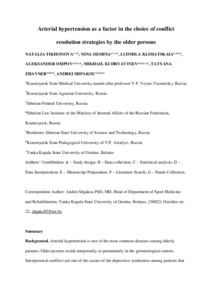Arterial hypertension as a factor in the choice of conflict resolution strategies by elderly persons
Скачать файл:
Автор:
Tikhonova, Natalia
Demina, Nina
Klimatskaia, Ludmila
Osipov, Aleksander
Kudryavtsev, Mikhail
Zhavner, Tatyana
Shpakou, Andrei
Коллективный автор:
Институт физической культуры, спорта и туризма
Институт филологии и языковой коммуникации
Кафедра физической культуры
Кафедра иностранных языков для инженерных направлений
Дата:
2018-12Журнал:
Family Medicine and Primary Care ReviewКвартиль журнала в Scopus:
Q3Квартиль журнала в Web of Science:
без квартиляБиблиографическое описание:
Tikhonova, Natalia. Arterial hypertension as a factor in the choice of conflict resolution strategies by elderly persons [Текст] / Natalia Tikhonova, Nina Demina, Ludmila Klimatskaia, Aleksander Osipov, Mikhail Kudryavtsev, Tatyana Zhavner, Andrei Shpakou // Family Medicine and Primary Care Review. — 2018. — Т. 20 (№ 4). — С. 368-372Текст статьи не публикуется в открытом доступе в соответствии с политикой журнала.
Аннотация:
Background. Interpersonal conflicts are one of the causes of depressive syndromes among patients, which contribute to
the development of arterial hypertension. Minimizing the risk of conflicts between elderly patients is necessary for providing effective therapy.
Objectives. To identify and analyze the behavioral patterns of elderly people in conflict situations suffering from and not suffering from hypertension.
Material and methods. The number of patients of the gerontological center who took part in the research amounted to 117 females (55+ years of age). The studies of the Thomas–Kilmann Instrument (TKI) conflict assessment methodology were used to identify the characteristics of the behavior of elderly patients in conflict situations.
Results. The largest number of patients was identified as the leading conflict resolution strategy in both groups. We agree that a significant number of those studied could not decide on the leading strategy of behavior in the conflict and use two or more strategies to resolve conflict situations. Patients with hypertension have higher rates of resistance to conflict than those who do not have this disease.
Conclusions. The strategy of adaptation is the leading strategy for resolving conflict situations among elderly people who have and have not been diagnosed with hypertension. This is why it was revealed that elderly people with hypertension have higher levels of resistance to conflict.

